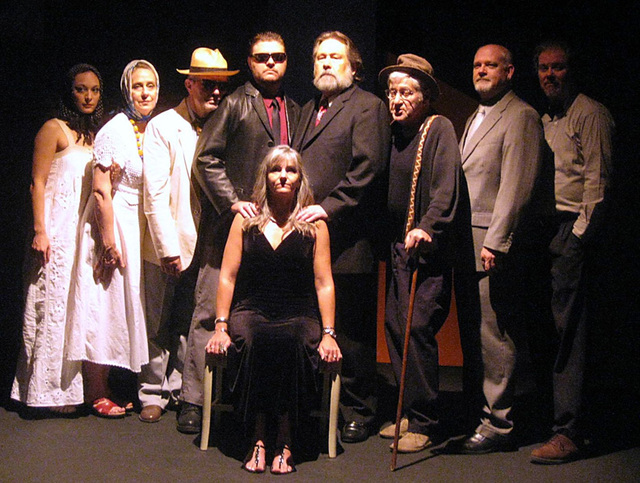In many ways, Sophocles’ Oedipus Re x epitomizes the Ancient Greek tragedy. The narrative is framed by prophecy; poetic priests foreshadow and omniscient oracles foretell each ruinous event. Past and present collide with catastrophic consequences, raising the eternal question: Is the individual ruled by fate or freewill? (The Ancients seem deleteriously attached to the power of the former.) A chorus of citizens speculates incessantly, often in echo of the audience’s observations.Meanwhile, the central characters—King Oedipus and his wife, Jocasta, who is also his baby mama and his mother—fall from royal grace to total devastation. They are warned of the family’s horrible destiny, as well as the destructive wrath of the gods against humans who interfere. But par for the Greek epic course, Jocasta attempts infanticide, Oedipus commits murder and they perpetrate incest, all in the ultimate interest of self-preservation—and often without knowledge of the full scope of their wrongdoing. The infamous tragedy culminates in Jocasta’s suicide and Oedipus’ rageful, self-inflicted blinding.“Modern” and “universal” may not be the first words that come to mind when thinking about this kind of subject matter, unless maybe you’re a Freudian. Yet Frank Melcori, local writer and director, believes the conflicts and emotions of the characters weave a story of “people like us, a family trying to figure things out.” He spent May through August adapting Oedipus Rex to illustrate its relevance to a contemporary audience.The result is Oedipus , a stripped-down version of Sophocles’ original. For many years, Melcori worked as a teacher of theater, which seems to explain the strong resemblance of his adaptation to a classroom lecture: main points, no fluff and a 70-minute window for completion. (Think of it as the CliffsNotes version.) Though a few key elements of Oedipus Rex are minimized by Melcori’s condensation (namely the importance of the Sphinx to Oedipus’ royal ascent), it is largely accurate and surprisingly effective. His decision to substitute two actors in the place of the Priest, a bevy of palace attendants and the above-mentioned chorus of citizens is a creative way to engage the original roles without overwhelming the small space of Auxiliary Dog Theatre, where the show is playing.Aesthetically, this “modern” Oedipus is not as current as one might hope. Though its simplicity is refreshing, the set takes after motel-room art—complete with a sponge-painted color scheme of peach, gray and cobalt blue—circa 1985. Jocasta’s stretchy, full-length, black velvet dress and Oedipus’ dark plastic sunglasses and terrible leather jacket indicate that many of the costumes arrived via the same unfortunate era. By contrast, Creon and the First Messenger don beautifully tailored suits that give a hint of Melcori’s modernist visual intentions. And that makes you wonder why everyone couldn’t be dressed so chicly, maybe against the backdrop of a plain black stage.Nine actors comprise the cast, and they are charming; they love what they’re doing, even if, at times, they’re doing it a bit over-emphatically. Aaron Worley’s Oedipus is convincingly arrogant from his opening line, and he plays the character’s offenses with a strong and apropos obstinacy. In moments of supposed sensitivity or reflection, though, Worley feels blank. His counterpart, Yolanda Luchetti Knight, is exactly opposite; her anger is not believable and she lacks authority. But in Jocasta’s tearful desperation, Knight takes a memorable stride. Wynn Rowell delivers Creon with a calm confidence. Rowell is the star when it comes to imbuing Sophocles’ intent with a persuasively contemporary persona; perhaps it has something to do with his stunning suit, but he captures everything for which Melcori seems to strive in this production.The show-stealers appear in smaller parts with fewer lines. Alan Hudson’s Tiresias, a blind prophet—“bird reader,” to be precise— who delivers the play’s most ominous words, is dapper and determined. He appears bespectacled in circular shades, helped by a sight-cane, and confronts the headstrong Oedipus with assuredness and a foreboding tone. With similarly strong stage presence, Arthur Alpert’s Shepherd bears devastating news to the king. Though he respects the solemnity of his lines, something about Alpert’s delivery channels the comedic; it is unexpected, and it makes him unforgettable.Dated scenery and occasionally overzealous acting aside, the clarity of Melcori’s Oedipus is heartening. Through the modesty of his aspirations, Melcori’s production exceeds expectations. He and his cast paint the portrait of a family that could be like yours, just figuring things out—hopefully without complications of incest and murder and self-mutilation.
Oedipus by SophoclesAdapted and directed by Frank MelcoriFridays and Saturdays 8 p.m., Sundays 2 p.m. through Oct. 25Auxiliary Dog Theatre3011 Monte Vista NETalkback with the cast Sunday, Oct. 18Tickets $12, $10 students and seniors254-7716, www.auxdog.org









